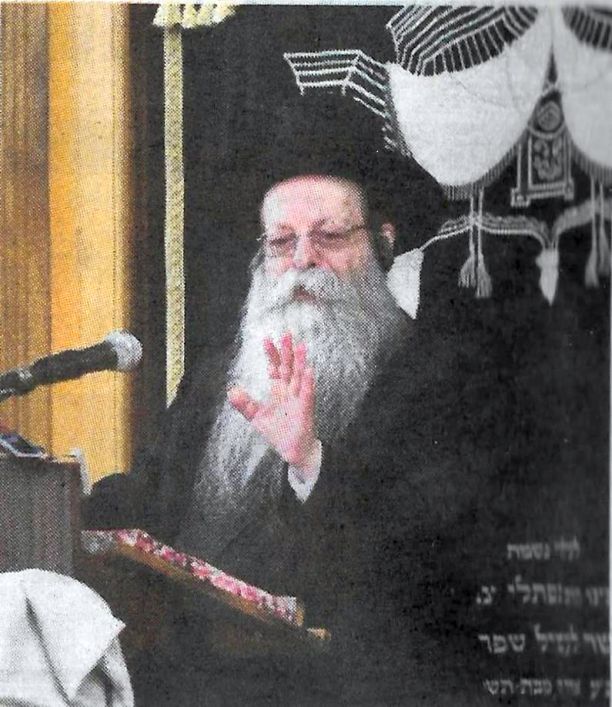
Why was Kalba Savua called by such a name?
Because he sustained all those who were hungry; everyone who entered his home 'hungry as a dog' (kalba) emerged fully sated (savua).
Notwithstanding, he refused to support his married daughter, Rochel. Why? Because she was a blight on his good name.
This, said HaRav Chaim Kanievsky, comes to teach us that a person can do endless acts of kindness to the entire world but the moment that one strikes a blow to his pride — even if it is his own daughter — he will refuse to help.
We interviewed the rosh yeshiva of Kiryas Melech and Tiferes Zion, HaRav Shlomo Kanievsky, and asked: In view of this period of Sefiras HaOmer and its preparation for the giving of the Torah, why is it particularly important to dwell on character improvement?
He replies: The giants of Mussar used to say that the forty-nine days of the Omer correspond to the 48 ways of acquiring Torah, with each day designated for the acquisition of an additional facet of Torah. The 49th day is set apart to review the 48 acquisitions up till then. One must toil each day to perfect the one particular aspect of that day.
One thing is clear: If we count the Omer day by day and anticipate the giving of the Torah, we have not accomplished a thing. This is not what is expected of us and not the reason why we were given this unique opportunity.
Rather, we are expected to examine ourselves, day by day, to see if the level of our preparedness towards the receiving of the Torah is rising to the challenge, day by day, reaching higher with each passing day. This way we can hope that the days will achieve their purpose and bring us to the Giving of the Torah fully ready and worthy of receiving it.
Referring to your question, Rabbenu Yonah on Pirkei Ovos (3:17) explains the words of the Mishnah: "If there is no derech eretz, consideration and decent behavior etc.. there is no Torah."
He says: "One must begin by improving oneself in character traits, thereby enabling Torah to reside by him. The Shechina never resides in a body which does not possess worthy attributes. One should not concentrate on first acquiring Torah and then focus on self-improvement for this does not work."
If we contemplate upon Rabbenu Yonah's words, we find them very demanding on the one side, but if we exert ourselves to implement them, we will find that we have acquired an unimaginable delight, both in this world and the next. "Torah cannot reside in a body which does not possess good character."
What does this actually mean?
We find Maseches Yoma teaches: "Rabi Yehoshua ben Levi says: Why is it written, '...this is the Torah which Moshe put... [that] If he merits, it becomes a nostrum of life. If he does not merit, it is a recipe for death. This is why Rabba said: If he learns its lessons, it is a nostrum of life but if he does not learn its lessons it is a poison. Rabi Shmuel bar Nachmeni said [in the name of] Rabi Yonoson: It is written: The directives of Hashem are straightforward, rejoicing the heart. And it is further written: The sayings of Hashem are purifying. If one is worthy, they prepare him for life. If he is not worthy they prepare him for death.
To try to illustrate. Consider two bochurim or avreichim sitting in the beis medrash. Both study diligently. Both come early and leave late. Both innovate and both learn steadily, without interruption. And so on. Nonetheless, at the end of the day, one is worthy and the Torah is an elixir of life for him. The other is not worthy and Torah is a potion of death for him!
What determines who is worthy? What causes one to have an elixir of life and the other a poison? And even more, how could the same Torah be both an elixir of life for one and a death potion for the other?
The answer is simple. One who is worthy means that he not only studied Torah, but that Torah changed him. The Torah turned him into a different being. A Torah-man!
But one who learned Torah, even a lot of Torah, but the Torah did not affect him, did not change him into another person, did not leave its stamp on him — he is not worthy. For him, not only will the Torah not be an elixir of life, it may well be a death potion.
What is the key factor that transforms one who learns Torah into a great person? The answer is that given by Rabbenu Yonah: "Torah cannot reside in a body which does not possess good character."
Good character is what connects the Torah to the person. It causes the Torah to become part of him, to change him for the good.
Good character and good middos are the essential basis for all positive relationships to one's surroundings, whether it is within the walls of the yeshiva, or the family home. Everything depends on good middos.




